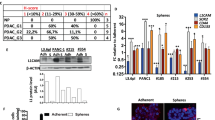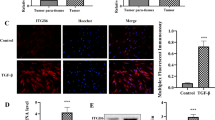Abstract
This study aimed to investigate the expression of Wnt2 protein in pancreatic cancer tissues and pancreatic stellate cells (PSCs), and determine its effect on the biological functions of pancreatic cancer cells. Immunohistochemistry was used to study the expression pattern of Wnt2 in pancreatic cancer tissues. The relationship between Wnt2 protein expression level and patient prognosis was analyzed. PSCs were isolated and cultured. The expression of Wnt2 in activated PSCs was investigated using Western blot and immunofluorescence. We also analyzed the effect of Wnt2 recombinant protein and stellate cell culture supernatant on the Wnt/β-catenin signaling pathway, as well as the effect of Wnt2 recombinant protein on the biological functions of pancreatic cancer cells. The expression of Wnt2 in interstitial cells of pancreatic cancer was correlated with the prognosis of pancreatic cancer. Wnt2 protein was expressed in activated PSCs. Both stellate cell culture supernatant and Wnt2 recombinant protein could activate the classic Wnt/β-catenin signaling pathway. Wnt2 protein enhanced the migration, invasion, and metastasis of pancreatic cancer cells. These results suggested that Wnt2 protein secreted by PSCs promoted the progression of pancreatic cancer by activating the classic Wnt/β-catenin signaling pathway.




Similar content being viewed by others
References
Siegel R, Ward E, Brawley O, Jemal A. Cancer statistics, 2011. CA Cancer J Clin. 2011;61(4):212–36.
Mario AS, Surabhi D-G, Amanda JR, Hidayatullah GM. Biochemical role of the collagen-rich tumour microenvironment in pancreatic cancer progression. Biochem J. 2012;441(2):541–52.
Bachem MG, Schneider E, Groß H, Weidenbach H, Schmid RM, Menke A, et al. Identification, culture, and characterization of pancreatic stellate cells in rats and humans. Gastroenterology. 1998;115(2):421–32.
Froeling FE, Mirza TA, Feakins RM, Seedhar A, Elia G, Hart IR, et al. Organotypic culture model of pancreatic cancer demonstrates that stromal cells modulate E-cadherin, β-catenin, and Ezrin expression in tumor cells. Am J Pathol. 2009;175(2):636–48.
Jiang H, Li Q, He C, Li F, Sheng H, Shen X, et al. Activation of the Wnt pathway through Wnt2 promotes metastasis in pancreatic cancer. Am J Cancer Res. 2014;4(5):537.
Yu M, Ting DT, Stott SL, Wittner BS, Ozsolak F, Paul S, et al. RNA sequencing of pancreatic circulating tumour cells implicates WNT signalling in metastasis. Nature. 2012;487(7408):510–3. doi:10.1038/nature11217.
Fu L, Zhang C, Zhang L-Y, Dong S-S, Lu L-H, Chen J, et al. Wnt2 secreted by tumour fibroblasts promotes tumour progression in oesophageal cancer by activation of the Wnt/β-catenin signalling pathway. Gut. 2011;60(12):1635–43.
Hu Y, Wan R, Yu G, Shen J, Ni J, Yin G, et al. Imbalance of Wnt/Dkk negative feedback promotes persistent activation of pancreatic stellate cells in chronic pancreatitis. PLoS One. 2014;9(4):e95145.
Erkan M, Adler G, Apte MV, Bachem MG, Buchholz M, Detlefsen S, et al. Stella TUM: current consensus and discussion on pancreatic stellate cell research. Gut. 2012;61(2):172–8. doi:10.1136/gutjnl-2011-301220.
Hwang RF, Moore T, Arumugam T, Ramachandran V, Amos KD, Rivera A, et al. Cancer-associated stromal fibroblasts promote pancreatic tumor progression. Cancer Res. 2008;68(3):918–26.
Erkan M, Reiser-Erkan C, Michalski CW, Deucker S, Sauliunaite D, Streit S, et al. Cancer-stellate cell interactions perpetuate the hypoxia-fibrosis cycle in pancreatic ductal adenocarcinoma. Neoplasia. 2009;11(5):497–508.
Vonlaufen A, Joshi S, Qu C, Phillips PA, Xu Z, Parker NR, et al. Pancreatic stellate cells: partners in crime with pancreatic cancer cells. Cancer Res. 2008;68(7):2085–93.
Froeling FE, Feig C, Chelala C, Dobson R, Mein CE, Tuveson DA, et al. Retinoic acid-induced pancreatic stellate cell quiescence reduces paracrine Wnt–β-catenin signaling to slow tumor progression. Gastroenterology. 2011;141(4):1486–97 e14.
Wells JM, Esni F, Boivin GP, Aronow BJ, Stuart W, Combs C, et al. Wnt/β-catenin signaling is required for development of the exocrine pancreas. BMC Dev Biol. 2007;7(1):4.
Zhang Y, Morris JP, Yan W, Schofield HK, Gurney A, Simeone DM, et al. Canonical Wnt signaling is required for pancreatic carcinogenesis. Cancer Res. 2013;73(15):4909–22.
Morris JP, Wang SC, Hebrok M. KRAS, Hedgehog, Wnt and the twisted developmental biology of pancreatic ductal adenocarcinoma. Nat Rev Cancer. 2010;10(10):683–95.
Park J, Song J, He T, Nam S, Lee J, Park W. Overexpression of Wnt-2 in colorectal cancers. Neoplasma. 2008;56(2):119–23.
Acknowledgments
This work was supported by grants from the Tian** City High School Science & Technology Fund Planning Project (No. 20130122).
Conflict of interest
The authors indicated no potential conflicts of interest.
Author information
Authors and Affiliations
Corresponding author
Additional information
Yong Xu, Hua Li and Chongbiao Huang have contributed equally to this work.
Rights and permissions
About this article
Cite this article
Xu, Y., Li, H., Huang, C. et al. Wnt2 protein plays a role in the progression of pancreatic cancer promoted by pancreatic stellate cells. Med Oncol 32, 97 (2015). https://doi.org/10.1007/s12032-015-0513-2
Received:
Accepted:
Published:
DOI: https://doi.org/10.1007/s12032-015-0513-2




